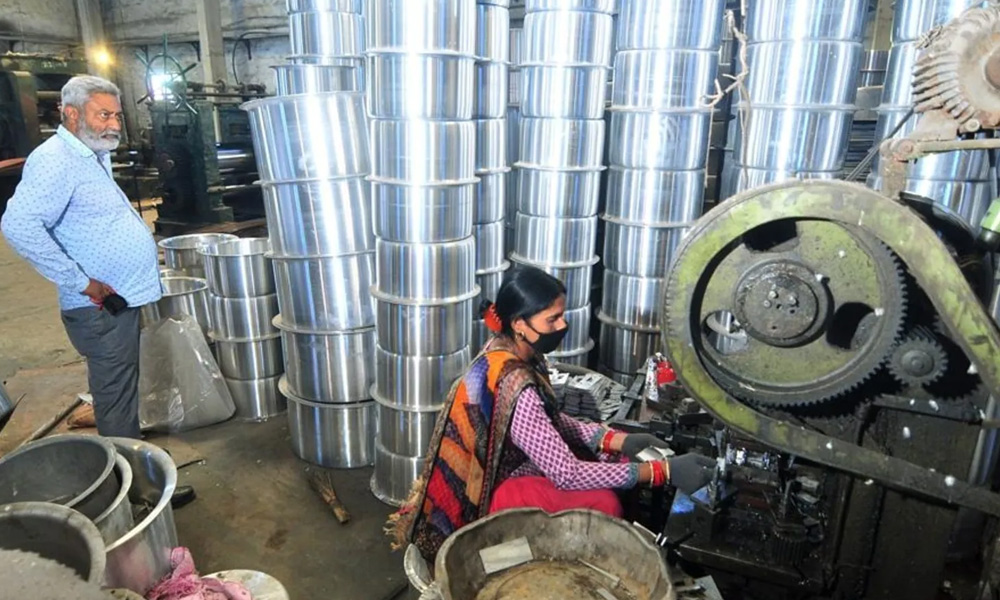
Image Credit: Hindustan Times
Second Wave Impact: 60 % Addition To Bad Loans From MSMEs
Writer: Madhusree Goswami
A mountain girl trying to make it big in the city. She loves to travel and explore and hence keen on doing on-ground stories. Giving the crux of the matter through her editing skills is her way to pay back the journalism its due credit.
India, 21 Jun 2021 1:47 PM GMT
Editor : Ankita Singh |
A literature lover who likes delving deeper into a wide range of societal issues and expresses her opinions about the same. Keeps looking for best-read recommendations while enjoying her coffee and tea.
Creatives : Madhusree Goswami
A mountain girl trying to make it big in the city. She loves to travel and explore and hence keen on doing on-ground stories. Giving the crux of the matter through her editing skills is her way to pay back the journalism its due credit.
Hotels, tourism, transport, aviation, trade and small manufacturing units, specific pockets of the economy are beginning to report a disproportionate impact of the distress, both in terms of decline in incomes and rise in loan repayment defaults.
After the first wave of the coronavirus waned last year, it looked like the economy was on the path to recovery. However, it was short-lived as cases started shooting up in April leading to lockdown-like restrictions in many states of the country. In May alone 10 million people lost their jobs.
The lockdowns have severely impacted MSMEs (medium and small scale enterprises) and service sectors, according to fresh data coming in on loan slippages with banks and micro-lenders, reported The Indian Express.
Which Sectors Have Been Hit The Hardest?
Hotels, tourism, transport, aviation, trade and small manufacturing units, specific pockets of the economy are beginning to report a disproportionate impact of the distress, both in terms of decline in incomes and rise in loan repayment defaults.
MSMEs and micro-enterprises have been the most impacted with nearly 60 per cent of addition to Non Performing Assets (NPAs) in April and May coming from MSMEs. This is nearly twice of what it was earlier. By the second week of April itself, the businesses were impacted by the pandemic, said a senior Indian Bank official.
A survey by LocalCircles in May said that 59% of startups and MSMEs are likely to scale down, shut down or sell themselves this year. "Only 22% Startups & MSMEs have more than 3-months runway; 41% are out of funds or have less than 1 month of funds left and 49% plan to reduce employee compensation and benefits costs by July," the survey said.
The banker pointed out that about 60 per cent of the NPA (of April and May) is from the MSME sector. "This used to be between 30-40 per cent earlier. The elements of the defaults are labour constraints, transportation issues due to lockdown, non-availability of raw material and uncertain cash flows," the banker added.
The Retailers Association of India said retail sales in the month of May 2021 stood at -79 per cent of the pre-COVID level of sales on a year-on-year comparison with May 2019. Indian Hotels, which reported a loss of ₹524 crore in FY2021, said its business was severely impacted during FY21 on account of COVID. Earlier this month, Hyatt Regency hotel near Mumbai international airport, a 400-room, five-star property, declared a temporary closure due to a lockdown-induced cash crunch faced by its owner Asian Hotels (West).
Consumer confidence in the current period, which has been in the negative since July 2019, dipped to a record low in May 2021.
Why Are MSMEs Important?
The MSME sector is the backbone of India's economy. It contributes to 30 per cent of India's GDP and 4 per cent of exports. Out of some 58 million MSMEs in India, more than 40 percent lack access to formal sources of finance. It employs about 111 million people in the country.
The greatest advantage of promoting small-scale industries and small businesses is that they provide employment without much government interference. SMEs encourage both urban and rural growth.
Recently, the World Bank said it has approved a $500 million program to support MSMEs in India to increase liquidity access for viable small businesses impacted by COVID-19.
Also Read: IAS Officer Who Saved Lives While Being COVID Positive Passes Away
 All section
All section














